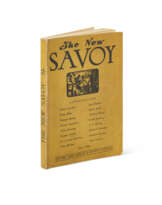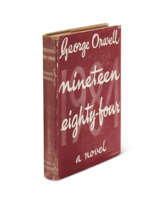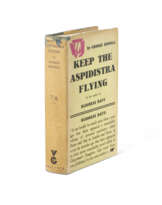ID 1016498
Lot 90 | Autograph letter signed ('Eric A. Blair') to Dennis [Collings]
Estimate value
£ 7 000 – 10 000
George Orwell
ORWELL, George (pseudonym of Eric Arthur Blair, 1903-1950)
Autograph letter signed ('Eric A. Blair') to Dennis [Collings], Mereworth, Kent, 4 September 1931.
In pencil. Closely written on three pages, 176 x 115mm, bifolium. Quarter morocco slipcase. Provenance: Bonhams, 24 March 2009, lot 169.
Orwell as a down and out, on life as a hop-picker in Kent. Orwell begins with an unappealing sketch of his current conditions ('we are slopping about here in the most appalling seas of slush, unable to work & with no occupation but trying to start fires with wet wood') before sketching his journey down on foot from London ('Four of us set out with about 4/- between us'), sleeping in a field, a wood, an unfinished house and a workhouse: 'We got most of our food on the way by begging, & did not go short of anything except tobacco, but the cold & discomfort of sleeping out of doors are worse than you would believe'. As for Orwell's travelling companion, he 'is & looks like the typical petty burglar, but is really a very likeable fellow'. The work of hop-picking has little to commend it: 'As to this hopping, it is a bloody swindle & only goes on because there is a large supply of casual labourers ready to do almost anything, & the East Enders rather like the trip to the country'. The pay is miserably low, and in spite of a recent law the accommodation scarcely better: 'Here 4 of us live in a tin hut about 12 feet across, with no glass in the windows, letting in the rain & draughts on all sides, & furnished only in with a large heap of straw. Here you shudder till about 5.45am, then up, get a fire going & make tea [and] hurry out to the fields ... Still it is rather fun for a short while, & I shall at any rate be able to make a saleable newspaper article out of it'. Orwell notes in passing that 'I have not sat in a chair for about 10 days', and passes on a few tips for life on the road, as well as some words of current slang ('Chat, a = a louse / Pony, a = a shit / ... Get = ?Word (noun) of abuse, but meaning uncertain'), and notes that rhyming slang is not, as he had thought, extinct, unlike 'the custom tramps used to have of marking doors where they had begged, to indicate what sort of reception they got', which is now quite unknown.
Orwell had first experimented with life as a tramp in and around London at the end of 1927, shortly after giving up his job as a policeman in Burma, and this experience was the basis of his first published essay, 'The Spike' (April 1931). After an experience of near-destitution in Paris in 1929 Orwell began to draft the first version of Down and Out in Paris and London in October 1930, later (after it was rejected by Jonathan Cape) supplementing it with material drawn from his 1927 London experiences and the expedition to Kent described in the present letter. Having been rejected by T.S. Eliot at Faber & Faber, Down and Out was eventually published by Victor Gollancz in January 1933, the first work to appear under Eric Blair’s newly-minted pseudonym ‘George Orwell’. The recipient, Dennis Collings, was a friend from Orwell's home town of Southwold. Published in Orwell. A Kind of Compulsion, ed. Peter Davison, 1998, no.112, pp. 227-8.
| Place of origin: | Northern Europe, Europe, United Kingdom |
|---|---|
| Auction house category: | Letters, documents and manuscripts |
| Place of origin: | Northern Europe, Europe, United Kingdom |
|---|---|
| Auction house category: | Letters, documents and manuscripts |
| Address of auction |
CHRISTIE'S 8 King Street, St. James's SW1Y 6QT London United Kingdom | |
|---|---|---|
| Preview |
| |
| Phone | +44 (0)20 7839 9060 | |
| Buyer Premium | see on Website | |
| Conditions of purchase | Conditions of purchase |
![Autograph letter signed (`Eric A. Blair`) to Dennis [Collings] - photo 1 Autograph letter signed (`Eric A. Blair`) to Dennis [Collings] - photo 1](/assets/image/picture_3069379/1e98c/a37bb91862ecb96e0686708f1d20b2561695852000jpg__fix_555_460.jpeg)
![Autograph letter signed (`Eric A. Blair`) to Dennis [Collings] - photo 2 Autograph letter signed (`Eric A. Blair`) to Dennis [Collings] - photo 2](/assets/image/picture_3069381/61782/c716aa9a238ac79780ecd5bcee0f8bf01695852000jpg__fix_555_460.jpeg)









![Autograph letter signed (`Eric A. Blair`) to Dennis [Collings] - photo 1 Autograph letter signed (`Eric A. Blair`) to Dennis [Collings] - photo 1](/cache/lot/1016498/a37bb91862ecb96e0686708f1d20b256_1695852000-80x80_center_50.jpg)
